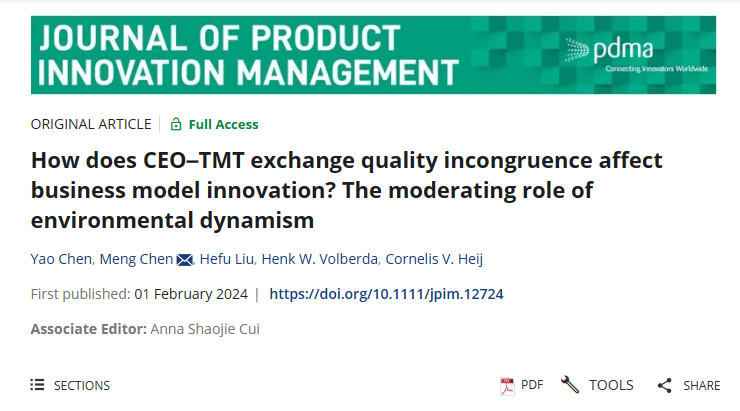成果速递:博士生陈瑶发表最新研究成果

Title:How does CEO–TMT exchange quality incongruence affect business model innovation? The moderating role of environmental dynamism;
Authors: Yao Chen, Meng Chen*, Hefu Liu, Henk W. Volberda, Cornelis V. Heij;
Journal: Journal of Product Innovation Management;
URL: https://doi.org/10.1111/jpim.12724;
Abstract:
In today's dynamic business environment, business model innovation (BMI) has become a strategic lever that businesses can harness to unlock new revenue opportunities and fortify their long-term competitive edge. BMI often hinges on the exchange relationships between chief executive officers (CEOs) and their top management team (TMT) members. However, in practice, CEOs and TMT members often have incongruent perceptions of these relationships, which may impede them from making joint efforts to achieve BMI. When such incongruence arises, relying solely on either the CEO's or the TMT members' perceptions of exchange quality might provide an incomplete understanding of the effect of CEO–TMT exchange quality on BMI. In this study, we investigate how CEO–TMT exchange quality incongruence influences BMI under various levels of environmental dynamism. Using archival industry data and matched survey data from 618 CEOs and 1854 TMT members in China, the polynomial regression and response surface analyses indicate that CEO–TMT exchange quality incongruence negatively affects BMI. This finding suggests that while high perceptions of exchange quality by both CEOs and TMTs independently contribute to BMI, an incongruent perception of exchange quality between CEOs and TMT members can undermine the success of BMI. Moreover, high levels of environmental dynamism aggravate the negative effect of CEO–TMT exchange quality incongruence on BMI. These findings enable us to offer new theoretical insights regarding the influence of the CEO–TMT exchange quality on BMI, thus complementing existing studies on antecedents of BMI and enriching literature on the outcomes of the CEO–TMT interface. Additionally, this study offers practical guidance for enhancing BMI through effective management of incongruent perceptions of CEO–TMT exchanges.
Acknowledgements:
The authors declare the following funding was received in support of the research: National Natural Science Foundation of China (72001155, 71971202, 72332007, and 71921001).
